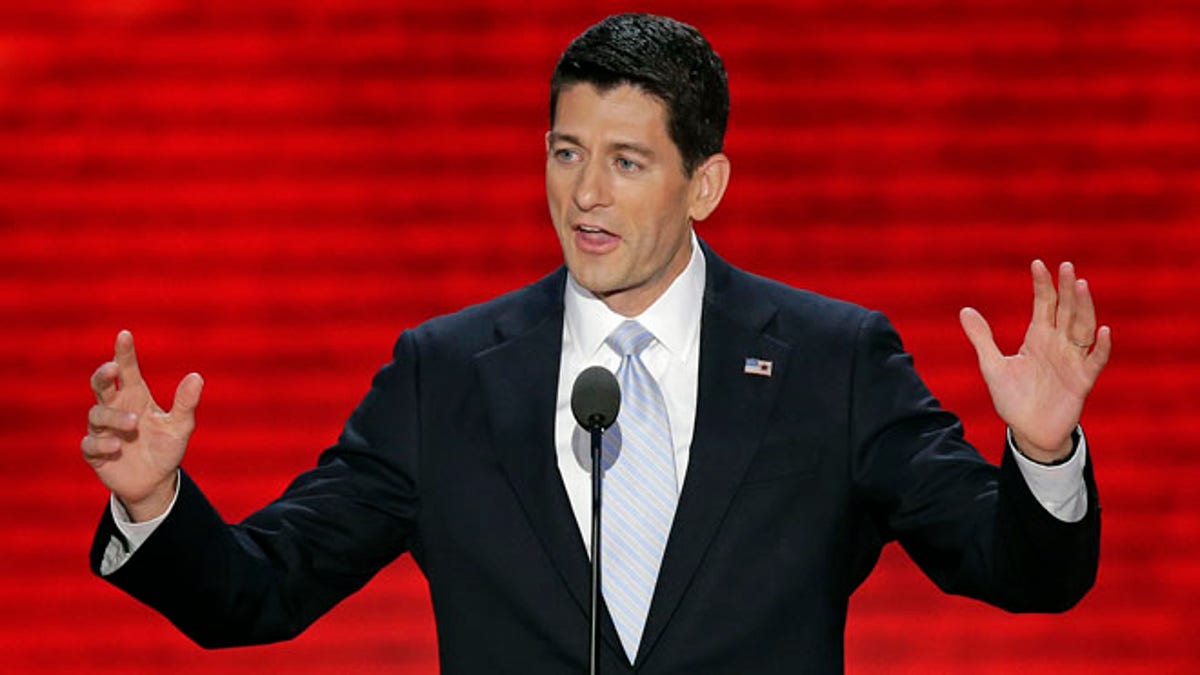
FILE: Aug. 29, 2012: Republican vice presidential nominee Rep. Paul Ryan addresses the Republican National Convention in Tampa, Fla. (AP)
If any political speech at the GOP convention can bring together Tea Partiers, independents and the Republican faithful, Rep. Paul Ryan’s was it.
Ryan drew a clear connection between fiscal responsibility in government and economic opportunity for the nation. It’s a connection the Tea Party has been making for more than three years, and the Republican Party is finally catching on.
Ryan distinguished the Romney-Ryan ticket from the Obama-Biden ticket on the core issues of economic freedom. Blasting the “sanctimony of the central planners,” Ryan touched on a foundational principle of conservatism: that individuals have the power to make better decisions than any bureaucrat in Washington could make for them. He also presented at least four clear positions on top issues among the conservative grassroots.
First, he pledged to repeal ObamaCare. When the grassroots came together this summer to develop the Freedom Platform, a list of the 12 most important policy proposals for the conservative movement in 2012, repealing ObamaCare was far and away the top choice. Freeing the economy from the burden of ObamaCare and replacing it with patient-centered health care reforms is an important first step.
Second, Ryan alluded to tax fairness. Instead of diving up the wealth, America needs policies that will encourage wealth creation – policies like the Flat Tax, another top issue for the grassroots. (The Republican platform adopted language supporting a “flatter tax,” which, while not ideal, represents significant progress.)
Third, he noted the huge need for regulatory reform that will ease the overwhelming burden placed on American business by the central planners in Washington. The problem is widespread, but the Environmental Protection Agency in particular has cost taxpayers billions of dollars, hampered U.S. production of energy, stalled innovation that would reduce our dependence on foreign oil. Reducing regulation and unleashing America’s vast energy potential were adopted by the GOP from the Freedom Platform, and deserves more focus throughout the campaign.
Fourth, Ryan emphasized the need to get federal spending under control by wrestling control away from the establishment practitioners of “political patronage, corporate welfare and cronyism at their worst.” Notably, Ryan did not spare Republicans from blame – alluding to reckless spending in the Bush years. When the government spends so much of our money, the real victims are the job seekers and job creators of tomorrow. Reversing Obama’s spending and passing a Balanced Budget Amendment are key planks of the Freedom Platform and important policies for righting our economic ship. Ryan understands this as well as the grassroots, and his commitment to set federal spending at 20 percent of GDP is a great start on the road to fiscal responsibility.
Ryan also touched on a key issue for a conservative-Republican alliance in 2012: trust. The grassroots movement has understandable trust issues with the Republican Party following many years of GOP fiscal irresponsibility rivaling the Democrats’. “I’ve tried to live up to their trust,” Ryan said of Wisconsin voters who have supported him overwhelmingly in seven U.S. House elections. If the rest of the Republican Party will take the same simple pledge, the GOP has a great chance to earn the enthusiastic support of the grassroots in November.